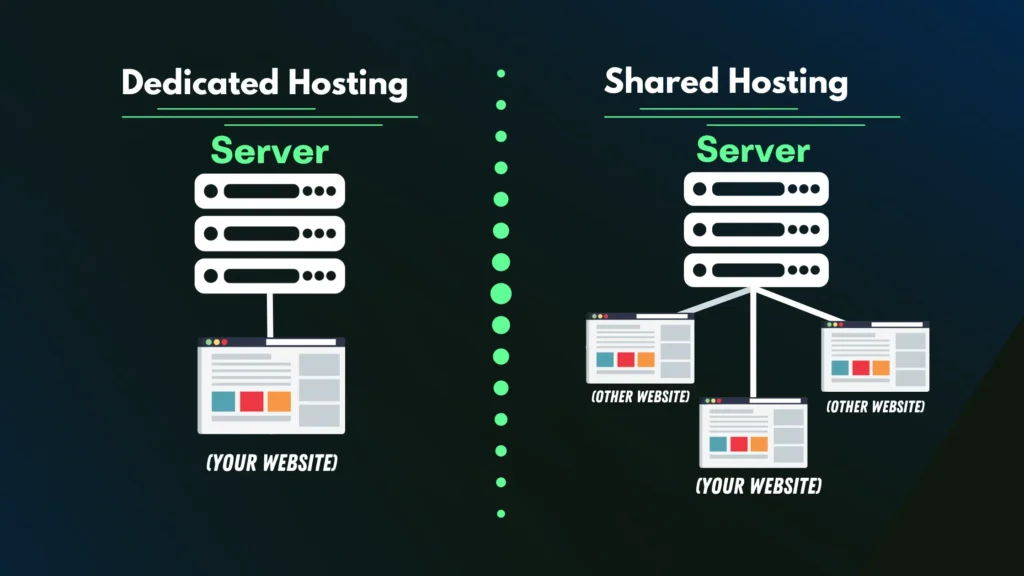
As we all know website hosting is a term that refers to the service of storing and making websites accessible on the Internet. There are various types of website hosting, each designed to meet different needs.
In this article, we will focus on dedicated hosting, which provides exclusive server access to clients. This service is ideal for businesses that require high performance, enhanced security, and customization options. With dedicated hosting, clients have complete control and functionality to run complex websites, databases, and applications.
What is Dedicated Server Hosting?
Dedicated hosting is a type of website hosting where clients are provided with an entire server that is exclusively dedicated to their websites or applications. This means that the server’s resources, including CPU, RAM, bandwidth, and storage space, are not shared with any other users.
How Does Dedicated Hosting Work?

Dedicated hosting operates by allocating a specific server to a single client. When a client chooses dedicated hosting, the hosting provider reserves a server exclusively for their use. Unlike shared hosting where resources are split among many users.
With dedicated hosting, the client has access to the entire server’s resources. This results in improved website performance and increased security since there are no other websites hosted on the server.
The client also has full access to the server, allowing them to configure and operate it according to their needs. This includes the ability to choose the type and level of security measures, operate the preferred operating system, and install necessary software applications.
Although this requires a certain level of technical expertise, many hosting providers offer managed plans where they handle the server management tasks.
What are the Benefits of using Dedicated Hosting?
It offers a wide range of exclusive features that bring numerous benefits to its users. let’s have a look at some of the features:
Who Should Use Dedicated Hosting?
It is ideal for businesses with high-traffic websites, such as e-commerce, media houses, and large corporations. These businesses need excellent server performance and speed to handle traffic, provide a seamless customer experience, and support complex transactions.
Moreover, businesses handling sensitive information, like financial institutions, healthcare providers, and government agencies, can benefit from dedicated hosting’s enhanced security features. It safeguards website data from cyber threats with customizable security settings and preferred software installations, creating a secure hosting environment tailored to specific needs.
The exclusive access to server resources also minimizes the risk of server-related issues, ensuring reliable and continuous service delivery.
Managed vs Unmanaged Dedicated Server Hosting
When it comes to selecting dedicated server hosting, one of the crucial choices you’ll face is deciding between managed and unmanaged options. Both options have their own set of advantages and disadvantages, so it’s important to understand the differences between them before making a decision.
Managed Dedicated Server Hosting
Managed dedicated server hosting is a hosting option where the provider takes care of all technical aspects of managing your server. This includes operations like:
- Installing and configuring software
- Performing updates and security patches
- Monitoring server performance
- Handling technical issues related to server
Advantages
Disadvantages
Unmanaged Dedicated Server Hosting
Unmanaged dedicated server hosting is a hosting option where you are solely responsible for managing your server.
Advantages
Disadvantages
frequently asked questions
What is the main difference between dedicated hosting and shared hosting?
Dedicated hosting provides a server exclusively for your use, meaning all of its resources are dedicated to your website or application. In contrast, shared hosting involves multiple users sharing the resources of a single server.
Is technical expertise required to manage a dedicated server?
While managing a dedicated server does require some technical knowledge, many hosting providers offer managed plans. In these cases, the provider handles server management tasks, reducing the need for technical expertise on your part.
Is dedicated hosting more expensive than other hosting types?
Yes, dedicated hosting is generally more expensive than shared or virtual private server (VPS) hosting. The higher cost reflects the exclusive use of server resources and the enhanced performance, security, and customization options.
How does dedicated hosting enhance website security?
Dedicated hosting allows for customizable security settings and the installation of preferred security software. Also, as no other websites are hosted on your server, the risk of cross-site contamination is eliminated.
Can I upgrade my server resources with dedicated hosting?
Yes, dedicated hosting provides easy scalability. You can upgrade your server resources, such as CPU, RAM, and storage space, as your website’s needs grow.

